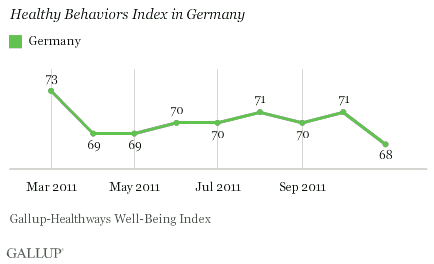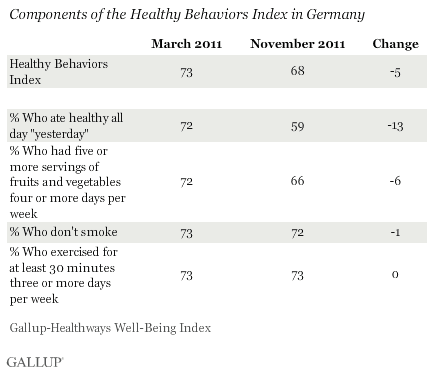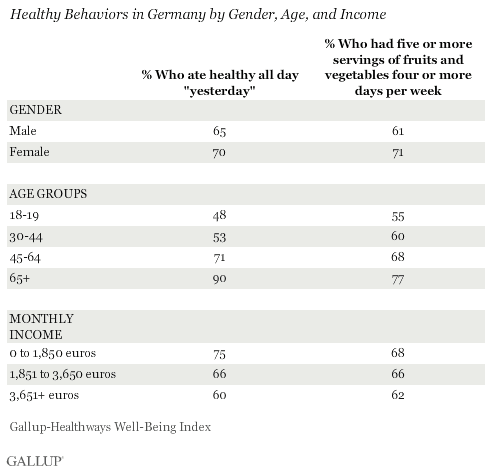BERLIN -- Fewer Germans reported good health habits in November than in previous months, with the Gallup-Healthways Healthy Behaviors Index decreasing to 68, from a high of 73 in March.

Gallup and Healthways ask approximately 1,000 Germans about their health habits each month as part of the Gallup-Healthways Well-Being Index, and have been doing so since March 2011. The Healthy Behaviors Index is made up of four items measuring Germans' eating, exercise, and smoking habits.
Fewer Germans Eating Healthily
The main reason the overall Healthy Behaviors Index has deteriorated is because there has been a decline in the percentage of Germans who report eating healthily. About 6 in 10 German adults said they ate healthy all day "yesterday" in November, down significantly from 7 in 10 in March. Additionally, the percentage of Germans who had five or more servings of fruits and vegetables at least four days per week decreased to 66% in November, from 72% in March.
Germans' smoking and exercise habits, however, are essentially unchanged from earlier this year.

Men and Young Adults Report Poorest Eating Habits
Men are less likely than women to report eating healthily and to eat fruits and vegetables frequently.
Healthy eating habits also improve with age. Young adults aged 18 to 29 are the least likely to report eating healthily the entire day prior to the survey and to eat fruits and vegetables frequently. As Germans get older, they become more likely to report good eating habits, with those aged 65 and older the most likely to eat healthily.
Gallup and Healthways find similar results by gender and age in the United States.

However, unlike in the United States, lower-income Germans report healthier eating behaviors than higher-income Germans. Seventy-five percent of Germans who earn 1,850 euros per month or less report eating healthily compared with 60% of those in the highest income group (3,651 or more euros per month).
Implications
The percentage of Germans eating healthily has fallen significantly to 6 in 10 in November from more than 7 in 10 in March. This has contributed to a decline in Germany's overall Healthy Behaviors Index score. Germans' poorer eating habits in November may be part of a seasonal trend. In the United States, Gallup and Healthways have found that Americans tend to exercise and eat less healthily in the fall and winter months.
Regardless, healthy eating habits are a critical component to good overall health. They are necessary for keeping fit and preventing weight gain. Poor eating habits are associated with being overweight and obese and can lead to higher healthcare costs. Thus, Germans leaders should take note of the recent decline in good eating habits and monitor whether it continues in the future.
View all Gallup-Healthways Well-Being Index questions and methodology.
About the Gallup-Healthways Well-Being Index
The Gallup-Healthways Well-Being Index tracks well-being in the U.S., U.K., and Germany and provides best-in-class solutions for a healthier world.
Survey Methods
Results are based on telephone interviews conducted as part of the Gallup-Healthways Well-Being Index survey from March 7-Nov. 30, 2011, with a random monthly sample of approximately 1,000 adults, aged 18 and older, living in Germany, selected using random-digit-dial sampling. The total sample for March to November was 8,512 adults.
For results based on the total sample of national adults, one can say with 95% confidence that the maximum margin of sampling error in Germany is ±3.7 percentage points for month-on-month changes and ±1.4 percentage points for the total sample.
Interviews are conducted with respondents on landline telephones and cellular phones. Samples are weighted by gender, age, education, region, adults in the household, and cell phone status. Demographic weighting targets are based on the most recently published population data from the German Statistics Office. All reported margins of sampling error include the computed design effects for weighting and sample design.
In addition to sampling error, question wording and practical difficulties in conducting surveys can introduce error or bias into the findings of public opinion polls.
For more details on Gallup's polling methodology, visit https://www.gallup.com/.
